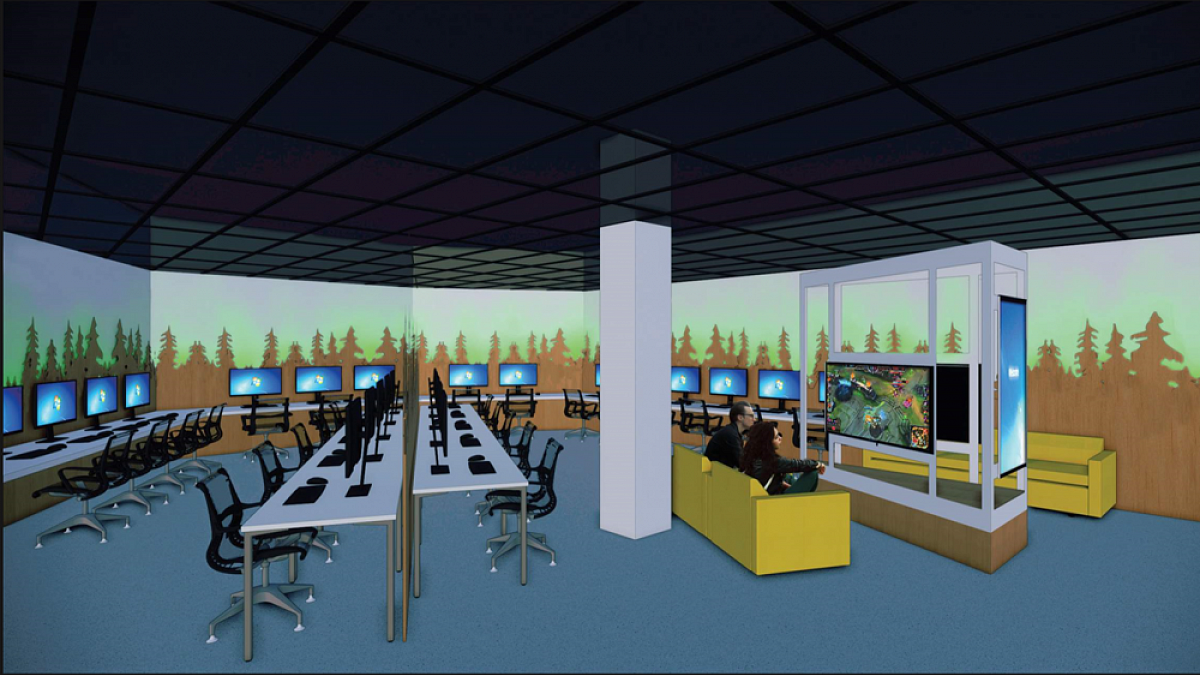For anyone keeping track last year, the University of Oregon’s esports team was full of surprises.
The “League of Legends” and “Call of Duty” teams both made the playoffs, and the “Rocket League” team made it to the finals. The biggest shock was when the UO’s “Hearthstone” team won the ESPN Collegiate Esports Championship and was flown to Texas by ESPN.
And all this happened while esports was still under the umbrella of UO Club Sports. For the 2019-20 school year the UO is announcing its official collegiate esports program, which will kick off with an expo on the Friday of homecoming weekend featuring interactive displays, a varsity demonstration and a keynote address by Maxwell Foxman, an assistant professor in the School of Journalism and Communication who specializes in video game studies.
An area in the Erb Memorial Union is being converted into an esports lounge and gaming arena. The room will be available to all UO students who want to be part of the gaming community and also will serve as practice and game space for varsity players. It is expected to open in winter term.
After the team’s successes, David Gugliotti, last year’s president of the gaming club, worked on spearheading the initiative to make esports an official UO program. He was hired as the esports director after finishing a graduate program in sports marketing last year.
Gugliotti said he is excited to start building up the program and recruiting new students to the university, but he knows he has to find sponsors to support the program first.
“We want to start bringing in pro players and doing events on campus geared around the industry side of things,” he said. “We need to be able to compete with these other schools that are giving out hundreds of thousands of dollars in scholarships. We’re going to make it happen; it’s just putting in the groundwork to get there.”
Last year the club was able to host two LAN events on campus where about 300 students brought their laptops from home and had game night as a community. Some members of the club were also able to go on a trip to Los Angeles where they saw more of the professional industry.
“There is, unfortunately, sometimes negative stigmas about what a gamer is, and we’re shattering those left and right,” Gugliotti said. “And it gives people who maybe don’t have a community something to attach to.”
Gugliotti stressed that esports helps more than varsity-level video game players. He mentions sports marketing and public relations, broadcasting, event coordination, coaches and analysts, even possible research projects that could be done on the new field.
One student is already using esports to build her professional portfolio. Sophomore art major Lauren Hutter isn’t on a varsity esports team; instead she’s a member of the gaming club, which is being kept relatively independent from the varsity program.
She does, however, create graphic designs to promote the varsity teams. Since working on graphic design for UO esports, Hutter has had more confidence in her abilities and started freelancing outside of school.
“Even from the beginning of the year to the end of the year I can look at my stuff and say I improved,’ she said. “It also really helped me learn to communicate with people and show off other people’s visions.”
Just like any sports program, esports is also a good academic motivator for students.
When Jermal Campbell transferred to the UO he had no friends and within just a few months he was on academic probation. Then Campbell saw a banner advertising the gaming club and went to a meeting, expressing interest in the not-yet-formed “Call of Duty” team.
Campbell hasn’t had under a 3.0 GPA since being an active member of the club. He’s on track for graduation and is the team manager, helping coach the “Call of Duty” team, giving feedback on players’ gaming, strategizing game plans based on different maps, helping guide practice and making sure team members are staying on top of responsibilities outside of esports.
For Campbell the new program means that members of his team can all practice in one place, so it will be easier to coach and easier to make sure players are taking breaks to do their homework and get exercise. They also won’t have to rely on a bad internet connection at home during important games.
With the new space, “I can sit down and talk to the guys about how we're going to go about certain matches and just be able to establish a day for studying or a day for just reviewing our matches,” he said. “That’s something that’s going to be really important for us, because at the end of the day we believe that school’s first.”
Students who want to get involved in esports at the UO can follow the program on Twitter at @uoesports, watch their Twitch streams at twitch.tv/universityoforegon and reach out on Discord.gg/uoesports.
—By Patience Greene, Student Services and Enrollment Management


